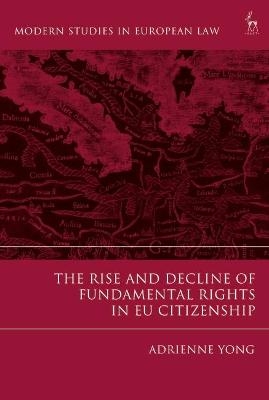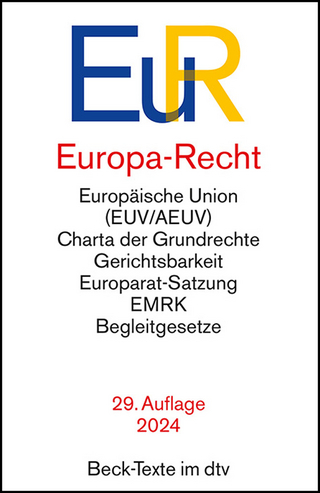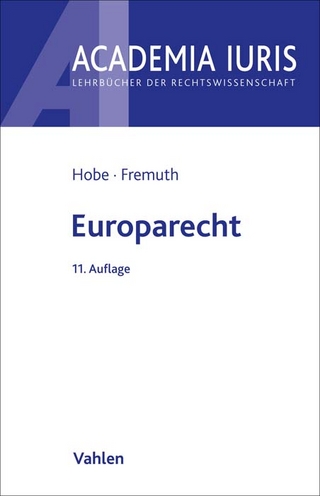
The Rise and Decline of Fundamental Rights in EU Citizenship
Hart Publishing (Verlag)
978-1-5099-4544-3 (ISBN)
Writing in the post UK–EU referendum environment, the author argues that this decline is attributable to increasing Euroscepticism, which has worsened since the Eurozone crisis and even more so in light of Brexit, and arguments made that leaving the EU would reduce immigration. This argument is particularly important to note given the rising fears of immigration that underlie much of the dissatisfaction with the EU project: a feeling prevalent not only in the UK. The chapters look at the rights of migrant EU citizens in Member States other than their own, and the guarantees that exist as a matter of protecting their fundamental human rights, which are present alongside rights enjoyed as part of being an EU citizen.
Adrienne Yong is Lecturer in Law at The City Law School, City, University of London under the Institute for the Study of European Laws (ISEL).
1. Examining EU Citizenship and its Relationship with EU Fundamental Rights
I. Introduction
II. Linking EU Citizenship and Fundamental Rights
A. Understanding EU Fundamental Rights
B. Legitimacy and Solidarity in the EU
C. The Role of the Court
III. The Legal Culture of the Court
IV. Judicial Instruments in EU Citizenship Law
A. The Principle of Non-discrimination (Article 18 TFEU)
B. The Principle of Proportionality
C. Protecting National Welfare Systems and the ‘Genuine Link’ Test
D. The ‘Purely Internal Situations’ Rule
E. The ‘Deprivation of Genuine Enjoyment’ Test
V. The Three Ages of EU Citizenship
A. The Age of Uncertainty: The UK’s Withdrawal from the EU
VI. Methodology and Outline of the Analysis
2. The Progressive Empowerment of EU Citizens through Judicial Instruments and Fundamental Rights
I. Introduction
II. Empowering the EU Citizen
A. Workers and Family Life
B. Non-discrimination as a Fundamental Right
C. Fundamental Rights Protection through Proportionality
D. Proving a Genuine Link
III. Cross-border Residency
A. The Purely Internal Situations Rule
B. Respect for Family Life and Identity
C. An Increasingly Tenuous Cross-border Link
D. The Problem of Reverse Discrimination
IV. Conclusion
3. The Growing Potential of EU Citizenship’s Relationship with Fundamental Rights
I. Introduction
II. Fundamental Rights in EU Citizenship Pre-Lisbon
A. AG Jacobs’ Opinion in Konstantinidis (1992)
B. The Rise of Fundamental Rights Protection in EU Citizenship
C. AG Colomer’s Opinion in Petersen (2008)
III. Fundamental Rights in EU Citizenship Post-Lisbon
A. Post-Lisbon, but Pre-Zambrano
B. AG Sharpston’s Opinion in Zambrano (2010)
i. Residency Rights and Third Country Nationals
ii. Fundamental Rights
C. An Independent Legal Basis for Citizenship Rights
IV. Conclusion
4. The Constitutional Crisis of EU Citizenship and Fundamental Rights
I. Introduction
II. The Aftermath of Zambrano
A. Restricting Scope in the McCarthy and Dereci Cases
B. ‘Genuine Enjoyment’ and Fundamental Rights
III. EU Citizenship Cases after Zambrano
A. ‘Genuine Enjoyment’ after McCarthy and Dereci
B. Patterns in Recent Case Law
IV. Conclusion
5. Fundamental Rights and EU Citizenship in a Eurosceptic EU
I. Introduction
II. The Effect of Europe’s Crisis on its Citizens
A. Struggles of the Status of EU Citizenship
B. The Effect of the Charter of Fundamental Rights
III. Linking EU Fundamental Rights with EU Citizenship
A. Implications of Human Rights Protection under the ECHR
B. Limits on Linking EU Fundamental Rights with EU Citizenship Status
C. The ECHR and EU Citizenship Going Forward
IV. Conclusion
6. The Unfolding Story of EU Citizenship and Fundamental Rights in Brexit Britain
I. Introduction
II. The Crisis of British Withdrawal from the EU
A. An Increasingly Eurosceptic UK and Deferential CJEU
B. Negotiating Citizens’ Rights
III. A ‘Just’ Brexit?
A. Human Rights as Realised by International Standards
B. Weaknesses of the ECHR
IV. Conclusion
7. Concluding Thoughts
| Erscheinungsdatum | 16.10.2020 |
|---|---|
| Reihe/Serie | Modern Studies in European Law |
| Verlagsort | Oxford |
| Sprache | englisch |
| Maße | 156 x 234 mm |
| Gewicht | 354 g |
| Themenwelt | Recht / Steuern ► EU / Internationales Recht |
| ISBN-10 | 1-5099-4544-X / 150994544X |
| ISBN-13 | 978-1-5099-4544-3 / 9781509945443 |
| Zustand | Neuware |
| Haben Sie eine Frage zum Produkt? |
aus dem Bereich


